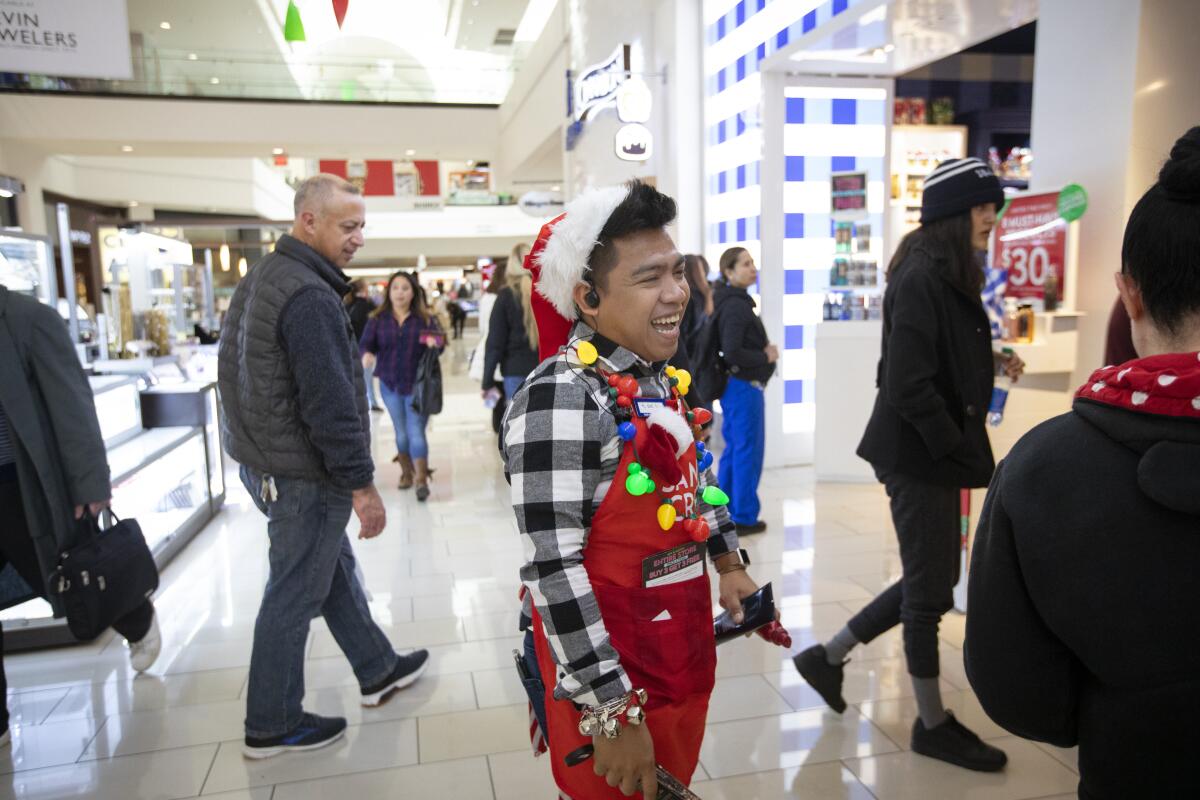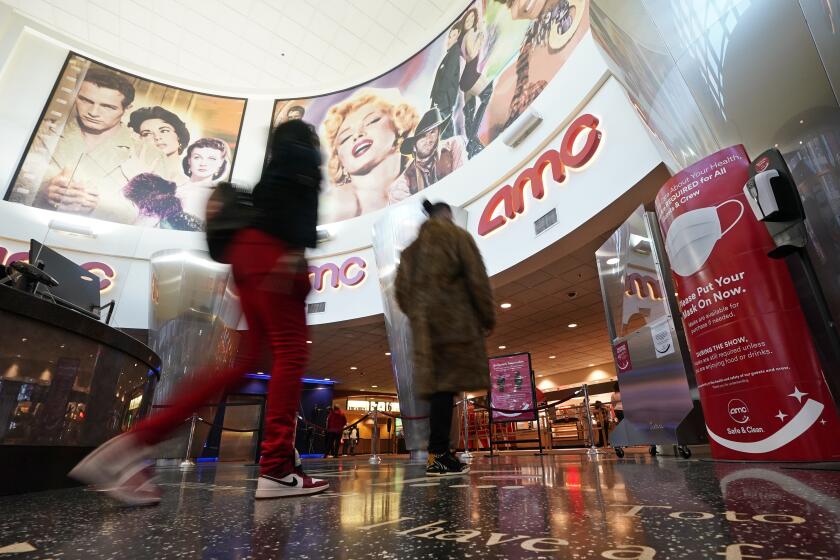Here’s what holiday retail workers wish you knew

- Share via
For many shoppers, the Black Friday weekend means finishing a hearty meal at home before venturing out to their favorite stores to try to snag the latest deal.
But for retail employees, the official kickoff of the holiday shopping season means their own holiday plans get cut short as they brace for the rush of sometimes cranky people.
“I’m kind of used to it, in the sense that I already know that I have to leave my family,” said a supervisor at a Best Buy store in Southern California, who like all the workers interviewed, spoke anonymously out of fear of repercussions from employers.
Over half of her family works in retail; to accommodate everyone’s working schedules, her Thanksgiving dinner has become a lunch. “Everyone has to leave to the stores,” she said.
The stresses of the season compound what is already a difficult way to make a living.
Over 140,000 people in Los Angeles work in retail, and eight in 10 of them must deal with schedules that vary drastically from week to week, according to a UCLA Labor Center Study. Haley Potiker, from Fair Workweek LA, an initiative to secure better working conditions for retail employees, notes that women of color comprise a large part of this workforce.
Some retailers go out of their way to make their employees feel more welcome working away from home on Thanksgiving, such as arranging special lunches for workers or offering extra pay.
A national movement to mandate stable hourly schedules for low-wage workers expanded to Los Angeles on Friday, as City Council members introduced a “Fair Workweek” measure that could affect some 70,000 retail employees in the city.
One general manager at a Best Buy store, who wasn’t authorized to speak publicly, said he understands the sacrifices that his employees have to make when working the holiday.
Managers try to provide a festive meal for their workers — bringing turkey, ham and other Thanksgiving staples — as a gesture that recognizes the sacrifices workers have to make to be there. Employees partake in the break room feast during their 45-minute lunch break.
“It’s like leaving one family to come to another,” he said, describing how closely his employees work together.
A collegial atmosphere among employees doesn’t mean that workers are shielded from the stress of working Black Friday. Gigantic crowds, often filled with shoppers primarily focused on securing a deal, make the holiday the most stressful day of the year for workers behind the counter.
The sheer number of shoppers makes the usual encounters between customers and cashiers relatively brief, but interactions with impatient or angry consumers can leave cashiers feeling shaken.
“Customers really do think that front-line retail workers are sort of a stand-in for the corporation as a whole, sometimes, and so they’ll really let loose on those workers,” Potiker said.
In addition, working hours on these days can be grueling.
One cashier working the counter at a big-box retailer said her Thanksgiving shift began at 4 p.m. and lasted until 12:30 a.m. Workers are sometimes held back to make sure workflow can resume normally after they clock out. Leaving punctually or not, she had to report back to the store before 8 a.m. for her next shift.
Still, she says this isn’t the longest Black Friday shift she’s had to work: At Walmart a couple of years ago, she started work at 5 p.m. on Thanksgiving and didn’t stop until 5 a.m. the next day.
Though workers get compensated overtime for the hours they work past their set schedule, the extra time can be rough.
“It doesn’t matter in a sense” what the overtime rates are, the Best Buy supervisor commented on working past her shift. “Because my body doesn’t know that it’s overtime. It just knows it’s not gonna get enough sleep from today until tomorrow.”
Many retail workers find themselves with no choice but to accept this schedule. Throughout the year, employees are often uncertain of the number of hours they’ll work a given week, Potiker said. Even after these hours are posted, they’re subject to change.
The UCLA Labor Study reported that most workers have faced last-minute changes or cancellations to their hours even after they had been posted.
This uncertainty leads to an unstable source of income and added anxiety for workers who rely on that pay. According to the study, one in two retail workers are late in paying their bills. Potiker noted that despite the intensity of Black Friday shifts, workers sometimes think that “at least they’re finally working full time and earning enough in overtime wages to start getting ahead.”
“Is it selfish to say the money helps?” one employee at Best Buy joked on Friday morning. He didn’t really have a choice as a new hire about whether to work Black Friday, though neither did more veteran employees.
Many big-box retailers employ an all-hands-on-deck scheduling plan when it comes to Black Friday. At one Best Buy, employees say there are nearly a hundred workers on the floor during the Thanksgiving rush, either retrieving items for customers, working every cash register or making sure that nothing gets stolen.
They say it’s difficult giving an exact number of customers that they serve, but one guessed that at least a thousand people flow in and out of the store. The Best Buy supervisor explained how last year, for example, the rush of people coming into her store started at 5 p.m. on Thanksgiving and didn’t slow down until 1 a.m.
The supervisor said she wished customers would be more empathetic and patient when interacting with retail workers. “We’re already giving our time and our time with our families just to be here.”
Another Best Buy cashier echoed a similar sentiment. Rude customers “don’t realize that we’re people and what they say is obviously going to affect us.”
She, too, wants customers to recognize the time that employees are spending away from their families; working Thanksgiving this year means that she won’t be able to spend time with her godparents, whom she doesn’t see for months at a time.
“Something that really bothers me is when [customers] say, like, ‘Oh, I’m sorry you have to work on Thanksgiving, that sucks,’ ” she said. “But they’re literally the reason that you’re working on Thanksgiving.
“If you really cared about the fact that we’re working on Thanksgiving and we’re away from our families, why would you come into the store?”
More to Read
Inside the business of entertainment
The Wide Shot brings you news, analysis and insights on everything from streaming wars to production — and what it all means for the future.
You may occasionally receive promotional content from the Los Angeles Times.












